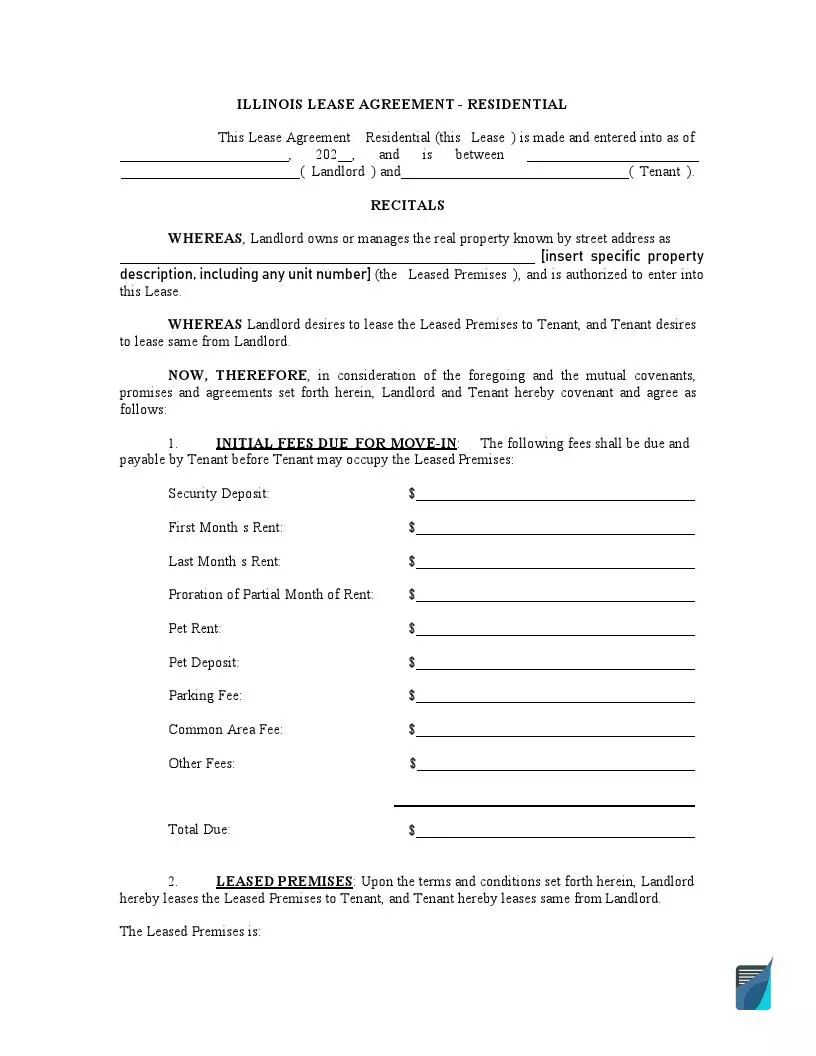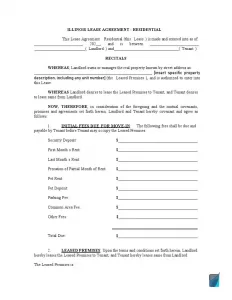Illinois Rental Lease Agreement Forms
If an individual wants to rent a property for residential or commercial use, they often negotiate directly with the lessor. The lessor and the lessee agree on certain conditions of the lease, such as the lease period, the conditions for lease renewal, and others. In Illinois, these conditions are included in a rental or lease agreement, a legal document binding both parties in a contract outlining their rights and responsibilities.
In Illinois, verbal agreements are acceptable for leases not exceeding one year. However, this form of agreement is rarely used as it is difficult to prove or determine the terms outlined orally. It is better to have a written rental agreement so that both the landlord and the tenant know where they stand.

Build Your Document
Answer a few simple questions to make your document in minutes
Save and Print
Save progress and finish on any device, download and print anytime
Sign and Use
Your valid, lawyer-approved document is ready
Illinois Laws and Lease Requirements
Security Deposit
Before starting the tenancy, the landlord defines the security deposit for the property, also called “a damage deposit.” This other term partially explains the purpose of this deposit. If the tenant or their guests damage the property or items inside it that has been put in there by the lessor, the damage deposit will cover the costs. It is important to note that security deposits do not cover “normal wear and tear.” When an item is damaged in the course of appropriate use or with time, the landlord cannot claim any deductions for it.
In Illinois, there is no set limit for a security deposit. There are some other rules, though, mainly regarding how the deposit is to be returned. The landlord has to return the deposit, if it is to be left intact, within 45 days from the date of termination of the lease. In case there are deductions, they should do it within 30 days, explaining the deductions and confirming the actual costs of repairs or replacements.
Landlord Right of Entry
Illinois laws do not state whether the landlord needs to notify the tenant that they are planning to enter the property. Therefore, they do not have to do it in case of an emergency or during any other reasonable situation. It is common, though, to have such a clause in the agreement stating that the landlord can enter the property with notice and at reasonable times.
Mandatory Disclosures
In the United States, landlords who let out properties built before 1978 must provide a lead-based paint disclosure. This applies to all states, including Illinois.
The following decisions should be included in a lease agreement in the state of Illinois:
- The period of the tenancy;
- Security deposit amount;
- Details of every tenant;
- Responsibilities of co-tenants (if there is more than one tenant) regarding the rent;
- The responsibilities regarding the maintenance of the property (if the landlord agrees to do it, then a reasonable timeframe should be defined).
There are many other paragraphs in a typical lease agreement that the landlord and the tenant usually agree on, such as, for example, whether the tenant can sublet.
Illinois Rental Lease Agreement Form Details
| Document Name | Illinois Rental Lease Agreement Form |
| Other Names | IL Rental Lease, Illinois Residential Lease Agreement |
| Relevant Laws | Illinois Compiled Statutes, Chapter 765, Section 705 |
| Security Deposit Amount | No limit |
| Security Deposit Return | Thirty (30) days (if deductions), or forty-five (45) days (if no deductions) |
| Avg. Time to Fill Out | 18 minutes |
| # of Fillable Fields | 119 |
| Available Formats | Adobe PDF |


Listed below are various other Illinois templates downloaded by our users. Try our simple builder to customize any of these documents to your preferences.
Other Rental Lease Agreement Forms by State
